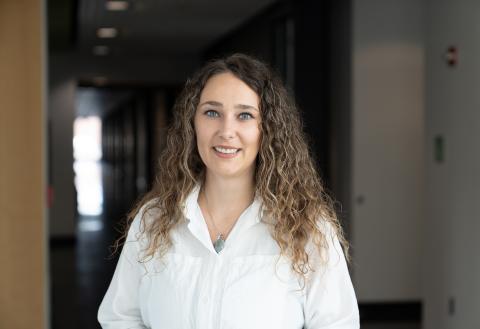
Milica Leti is a 4th year Ph.D. student in the Applied Mathematics department here at UNH. She specializes in numerical analysis/optimization theory and continuum mechanics. Leti is originally from Serbia, and graduated from the Faculty of Sciences in Novi Sad, Serbia with a degree in Applied Mathematics.
1. Why did you choose UNH for your graduate program?
I chose UNH for my graduate program because of the highly experienced and professional faculty in the applied mathematics department. I saw an opportunity to develop my skills in various areas of mathematical modeling and analysis, surrounded by an amazing group of peers and mentors. Additionally, the location in New Hampshire and its beautiful natural environment have been a huge draw for me. The applied mathematics program at UNH provides excellent opportunities for growth and learning.
2. What is your Research Focus?
I specialize in the optimization of existing methods used in crystal plasticity (mechanical engineering) for representing and exploring the deformation of metals at the microscale. My research aims to improve the efficiency, performance, and overall quality of crystal plasticity methods without changing their underlying functionality. Through this work, I hope to contribute to advancements in the field of computational material science and help develop more accurate and reliable tools for modeling the complex behavior of metallic materials. Additionally, I believe the methods I'm developing could have wide-ranging applications in other fields, such as finance, and I am interested in exploring how to implement similar approaches in those domains as well.
3. What are you hoping to accomplish with this research? How will it potentially impact society or day-to-day life?
Optimizing crystal plasticity models could have a significant impact in the e.g. aerospace industry. By improving the efficiency and performance of these computational methods, engineers could run faster, more detailed simulations of metal deformation, enabling insights that are difficult to obtain experimentally. For example, manufacturers could better predict the long-term fatigue and wear behavior of critical aircraft components, such as engine parts and landing gear. This would lead to the development of more durable and reliable aircraft, where physical testing has limitations. These enhanced computational capabilities can drive innovation and improve product quality in ways that are not even possible to achieve through experimental means alone, ultimately enhancing safety and reducing maintenance costs for the aerospace sector.
4. What do you enjoy most about your experience at UNH?
As a student at the University of New Hampshire, what I enjoy most is the beautiful campus itself. The lush green spaces, the historic buildings, and the overall serene atmosphere provide a wonderful environment to learn, grow and enjoy. Beyond the physical setting, I'm also grateful for the many meaningful friendships I've been able to build here. My peers have been incredibly supportive, creating a true sense of community that has enriched my experience. Additionally, UNH has offered me countless opportunities to expand my knowledge and skills, both inside and outside the classroom. The abundant resources and support available to students have been invaluable in helping me develop professionally and personally. It is the combination of this picturesque campus, supportive community, and wealth of learning experiences that makes my time at UNH so rewarding.
5. What do you hope to do after your time at UNH?
After my time at the University of New Hampshire, I'm honestly not entirely sure what the future holds. But I'm excited to see what opportunities arise and where my passions and skills may take me. I know I'd love the chance to share my knowledge and inspire others, so academia is certainly an appealing path. The prospect of applying my mathematical expertise to real-world challenges in industry is also intriguing. Truthfully, I'm keeping an open mind, as I've learned that the best-laid plans can change unexpectedly. What I do know is that my time at UNH has prepared me well, equipping me with a strong foundation and a thirst for continued growth and discovery. I'm looking forward to the possibilities that lie ahead, wherever they may lead.
6. What is your advice for someone on how to best prepare for a graduate program?
My advice for grad school prep is to approach it with unwavering willingness to succeed. Develop a strong foundation in your field through focused study and hands-on work. Cultivate a balanced strategy - this is key to thriving. Build relationships with mentors. Maintain your intellectual curiosity - this will carry you through. You'll never feel lonely, as you'll be surrounded by peers facing the same challenges. They'll be there to support you. Grad programs also offer amazing resources and events to support your journey. With the right mindset, preparation, and support network, you can truly excel in graduate school. Good luck!